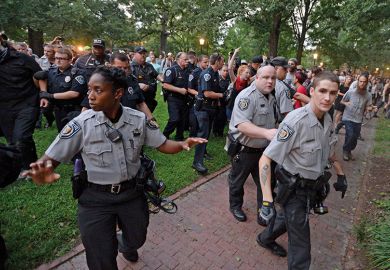One year after its police appeared to have backed an attack against LGBTQ students, a US university is looking to become a model of tolerance and community-building in campus law enforcement.
In May 2021, officers at Bucknell University in Pennsylvania allegedly stood by and even sympathised with fraternity members besieging the former Tau Kappa Epsilon house after the chapter was banned and the building converted into LGBTQ housing.
It was among the more shocking events in a series of problems over the years at a rural institution where most students eligible to join Greek life do so, and that ranks higher nationally for its partying than for its academics.
The moment led Bucknell’s administration to promise change, and this January it brought in Anthony Morgan, a reform-oriented police leader most recently at California’s Humboldt State University, as its new chief of public safety.
Mr Morgan has wasted little time, introducing to his police force the use of body cameras and an innovative line of community satisfaction surveys, and taking steps towards sensitivity training and the use of non-armed personnel for calls that don’t require them.
“I’m really focused on how we can move forward and have relationships with all of the different communities that make up Bucknell – and that includes our students who come from marginalised communities,” he said.
Across the US, on college campuses and beyond, police often find themselves along the front lines of political tension and violence as discriminatory public policy decisions produce their almost-inevitable real-world effects. Mr Morgan has experience in both types of environment, having served last year at Humboldt State – now known as Cal Poly Humboldt – after spending about 18 years in various municipal departments around the US. Those stops include a small town outside Washington, DC, where he was its first black police chief.
His predecessor at Bucknell, Steve Barilar, was a 26-year Pennsylvania state police trooper who retired in 2011 and then sought the university posting to ride out his career. Mr Barilar left Bucknell this year under a cloud of ethical complaints and student protests over his commitment to fighting campus sexual assault, and alleged gender- and race-based bias among officers.
Bucknell hasn’t announced any penalties against police over their actions last year at Fran’s House, the former fraternity house converted into an LGBTQ residence, citing confidentiality rules. That incident involved about 20 male students yelling, banging on the doors and windows, and urinating on the front porch, while late-arriving police allegedly laughed and assured the attackers they’d try to help them get their house back.
The Bucknell police department has funding for 24 staff, including 14 officers. Mr Morgan acknowledged he has vacancies, but he said nobody has left because of his changes, which include classes starting this month – developed by Bucknell’s diversity, equity and inclusion office – on best practices for providing services to members of marginalised communities.
The classes have, however, required some explaining. “I’ve shared with them: we’re doing this so you can be the best version of yourself on this campus serving the community – not taking into account things that maybe happened, or allegations, or those things, but how do we meet a standard of excellence in service,” Mr Morgan said. “And we can’t do it if we aren’t as well trained as possible.”
The bigger-picture goal, he told Times Higher Education, was a police force capable of listening, a vital skill that becomes even more important in a college environment of young people constantly challenging boundaries. “Their communication skills, I think, have to be extremely fine-tuned,” he said of his officers, “meaning that they have to really value listening – and active listening – to others, and then really communicating the ‘why’ back.”
And while police-worn body cameras have become commonplace in the US, the Bucknell force under Mr Morgan appears ahead of the crowd in joining Guardian Score – a system in which officers are required to provide to people they encounter a card with a QR code that lets them rate and comment on the interaction. It’s run by a private company, with the aim of raising public confidence that participants will be heard and protected.
In its first three months, to mid-June, at least 230 people have participated. “I’m extremely pleased we got that number of responses back,” Mr Morgan said. None of the comments, he said, have produced a concern serious enough that he had to raise it with an officer.
Not that all controversy is gone. While Mr Morgan is about to begin hiring staff for his new non-armed response units, some Bucknell students remain upset to see officers still walking their campus with weapons displayed. Mr Morgan said he was still considering additional reforms but believed officers need to protect themselves, and that visibly armed officers may remain a matter where they have to “agree to disagree”.
POSTSCRIPT:
Print headline: Listen up! Campus policing can be fixed
Register to continue
Why register?
- Registration is free and only takes a moment
- Once registered, you can read 3 articles a month
- Sign up for our newsletter
Subscribe
Or subscribe for unlimited access to:
- Unlimited access to news, views, insights & reviews
- Digital editions
- Digital access to THE’s university and college rankings analysis
Already registered or a current subscriber?








